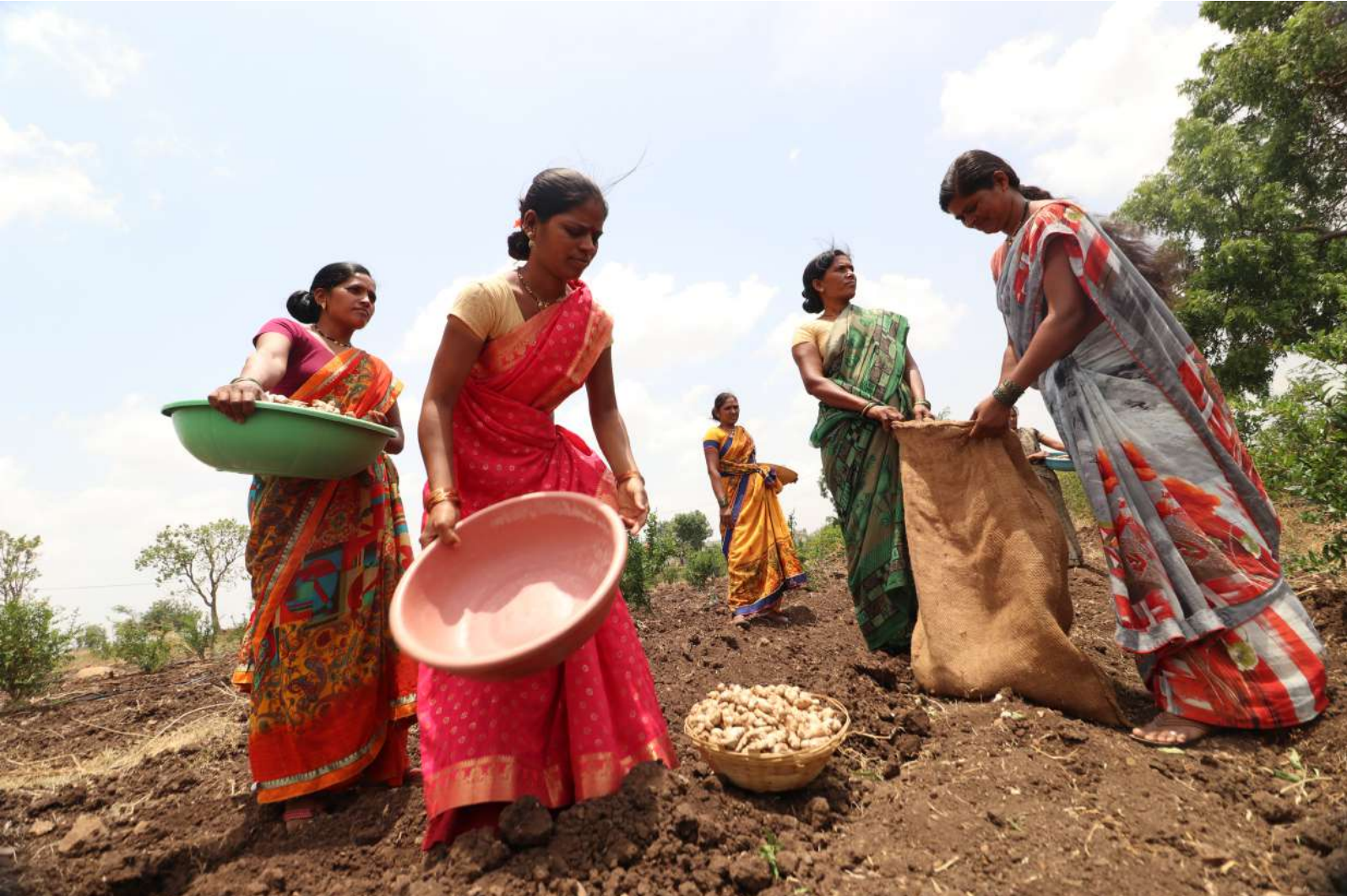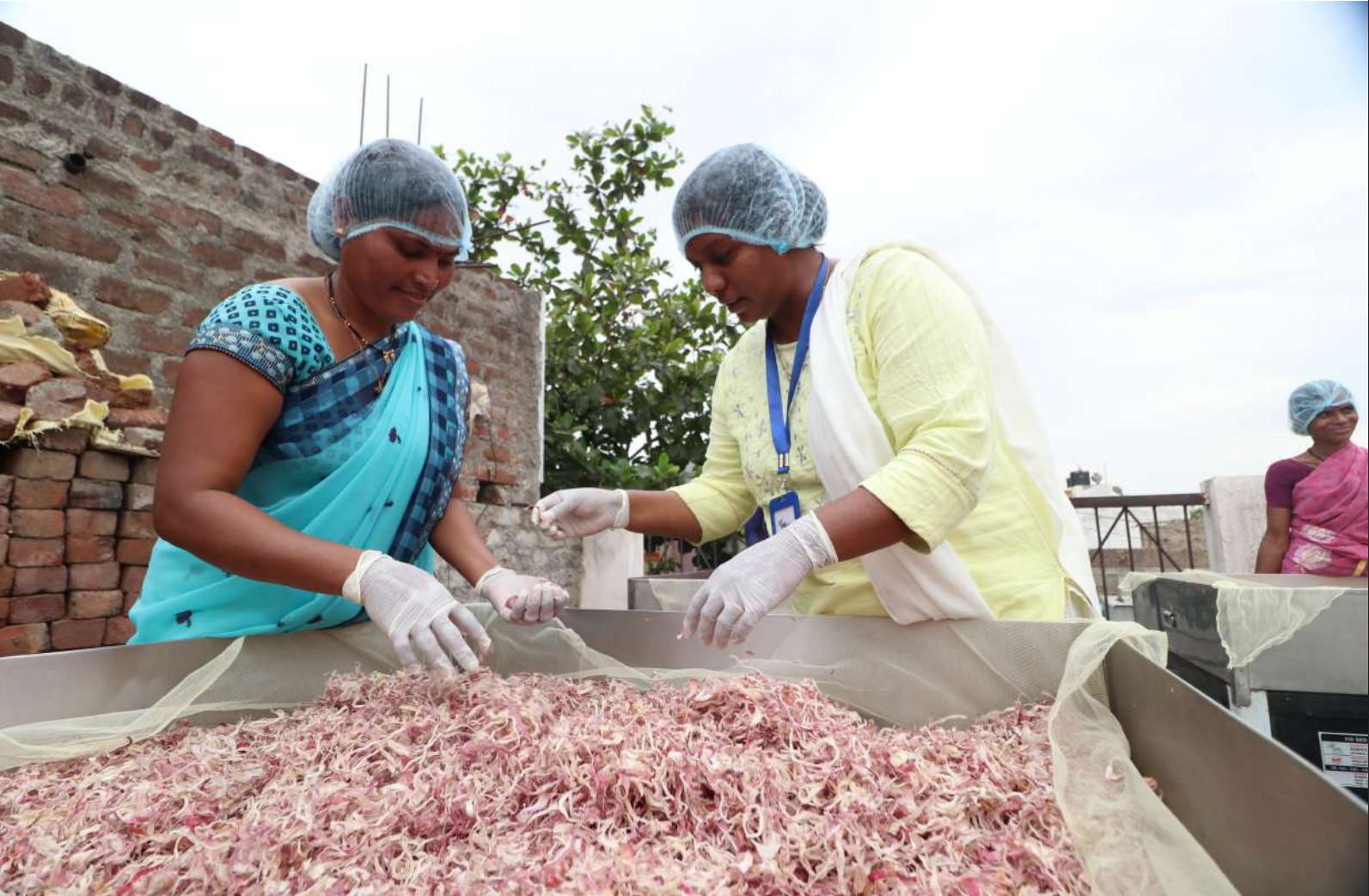Solar-powered food processors empower female farmers in India
Organization: Science for Society Techno Services Pvt Ltd
Beneficiaries: 500-2500
Women across three states in India are converting farm losses into food ingredients by using innovative solar-powered food processing systems, helping to prevent carbon emissions while they earn an assured additional income.
Every year, India loses a staggering 60 million tons of agri-produce as post-harvest losses. Many crops that are perfectly edible never reach market simply because they do not meet strict aesthetic standards of size and shape, with around 40 percent of total fruit and vegetable production nationally going unsold. In addition, many farms in India have no access to refrigeration, so unsold produce quickly rots in the heat.
Wastage on this scale has a huge impact on local people and the planet, hitting farmers’ pockets and contributing to climate change through unnecessary agricultural GHG emissions. “Last year was great,” says farmer Madan Saud. “But this year, because it rained so much the produce was low quality. At least 50 percent of the tomatoes were rejected.” To tackle these interlinked problems, the Maharashtra-based company S4S (Science for Society) Technologies launched their intervention – Decentralized Solar Powered Food Processing by Women Farmers for economic empowerment – to empower female farmers and help create a new food ecosystem.  S4S today works with 1,200 women farmers to preserve food at the farm gate. By using the solar-powered dryers, farmers are able to increase the shelf-life of produce by up to a year, and help to provide nutrition-rich, non-perishable, ready-to-use food products to the Food and Beverage Industry. In total, 800 solar dryers have been supplied to women in rural India, many of whom would have otherwise struggled to find regular work and a reliable income. “If you go to other villages you’ll see women have nothing to do,” says Gandhali Deshmukh from S4S. “Thanks to this project the women can work from home and earn some money.”
S4S today works with 1,200 women farmers to preserve food at the farm gate. By using the solar-powered dryers, farmers are able to increase the shelf-life of produce by up to a year, and help to provide nutrition-rich, non-perishable, ready-to-use food products to the Food and Beverage Industry. In total, 800 solar dryers have been supplied to women in rural India, many of whom would have otherwise struggled to find regular work and a reliable income. “If you go to other villages you’ll see women have nothing to do,” says Gandhali Deshmukh from S4S. “Thanks to this project the women can work from home and earn some money.”
The female farmers take unsold produce, chop it up and then dehydrate it using the Solar Conduction Dryers (SCD) – electricity-free solar powered food dehydrators that reduce moisture content in agro-produce. The temperature inside can reach 75c, and they completely dry out food in only four hours. Without water, the microbes that cause rotting are unable to survive, which preserves the food without need to use chemicals. All sorts of foodstuffs can be processed and preserved into dehydrated form, from fruits, vegetables, spices, legumes, beans and millets, to fish and meat.
 This prevents food wastage, uses renewable energy, and provides the female farmers with an additional income of 50 to 200 percent as they sell their surplus produce direct to S4S. The dried food is collected every few days by the company, after which it is taken to their factory for processing and packaging, and then delivered to restaurants and food companies. It is estimated that this prevents 40,000 tonnes of food going to waste every year.
This prevents food wastage, uses renewable energy, and provides the female farmers with an additional income of 50 to 200 percent as they sell their surplus produce direct to S4S. The dried food is collected every few days by the company, after which it is taken to their factory for processing and packaging, and then delivered to restaurants and food companies. It is estimated that this prevents 40,000 tonnes of food going to waste every year.
Women are at the heart of the intervention. Indeed, the entire value chain is led by female entrepreneurs, with S4S helping to transform smallholder female farmers into micro-entrepreneurs and breadwinners within their families.
An additional income of $1,000 to 1,500 gives the female farmers added financial freedom. This promotes gender equality as it means that the women are no longer dependent on men to run their households, and it increases the female farmers’ spending power for everything from their children’s education to healthcare. Beyond the financial benefits, the increased self-belief and confidence that comes with this also plays a role in encouraging the women to assume greater participation in decision-making at a household level, together with taking leadership positions in their local communities. This in turn can help to change the perception of children about the roles that women play in society.
The female farmers are part of a carbon-positive and sustainable process. Aside from helping to reduce food waste – which globally accounts for about 8 percent of all GHG emissions – the project also helps tackle climate change in other ways. The removal of water at the farm gate reduces volume considerably, and therefore transportation-related CO2 emissions, while the fact that the dryers are electricity free is supporting rural communities not connected to a power supply.
The impact of S4S is monitored and governed by UN Women, DBS Foundation, and Yunus Social Business. Its advisory committee includes members from AgFunder USA, Unreasonable Group, Yunus Social Business, DBS Bank, Government of India, UN Women and World Economic Forum, and Accenture.
The company has worked with local implementation partners in Nepal and Bangladesh to replicate the model elsewhere. In addition, S4S partners with local governing bodies at a village level to raise awareness about nutrition and food wastage. This has inspired the government to replicate this model in other states of India. The company partners with financial institutions such as DBS Bank to make finance available to the farmers, and partners with NGOs to provide advisory services to farmers.